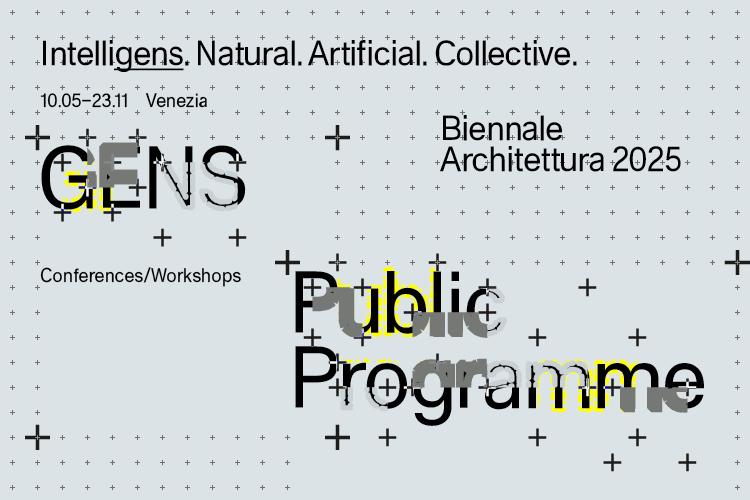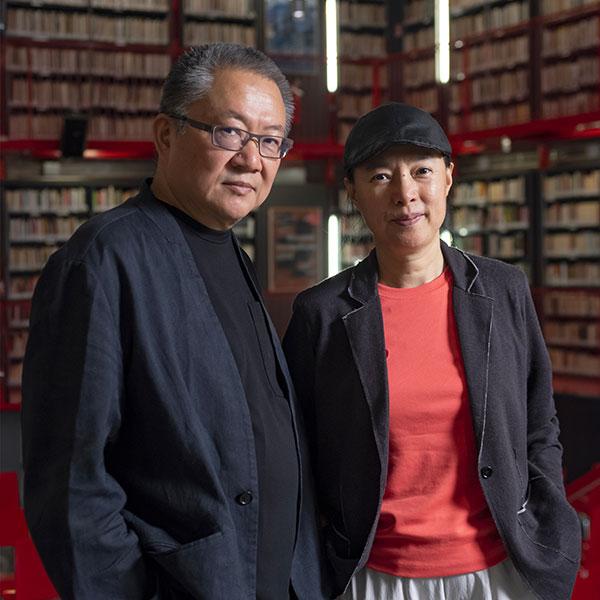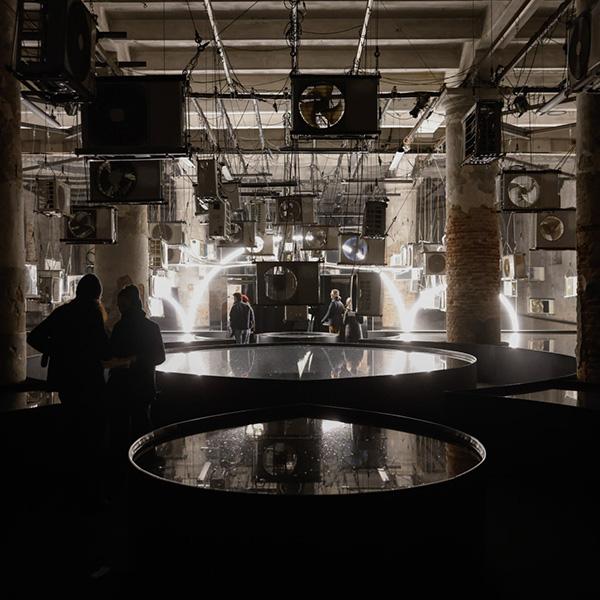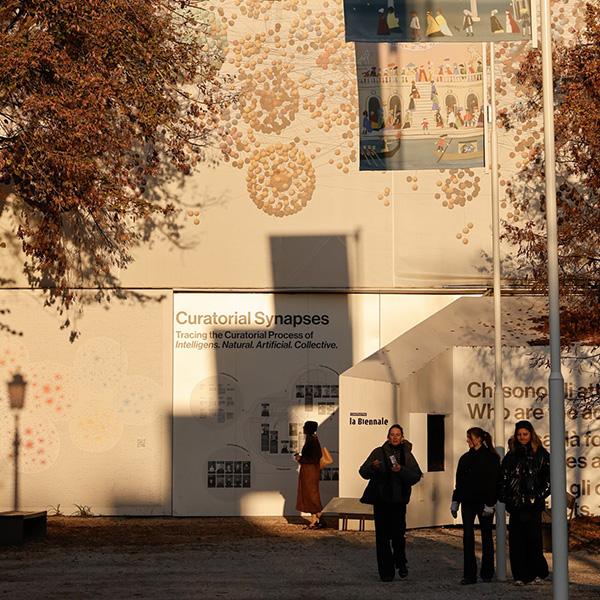
Conferences and Workshops scheduled for the month of October
GENS Public Programme: the October events to be held at the Speakers’ Corner at Corderie dell’Arsenale.
GENS PUBLIC PROGRAMME
The challenges of artificial intelligence, energy, ecology and climate adaptation, the domestic space and new forms of living, together with reflections on urban governance, the circular economy, and architectural criticism. These are some of the key themes of the October events of the GENS Public Programme, which accompany and enrich the 19th International Architecture Exhibition of La Biennale di Venezia, titled Intelligens. Natural. Artificial. Collective., curated by Carlo Ratti (10 May – 23 November 2025). The programme of events, held at the Speakers’ Corner in the Corderie dell’Arsenale and the Sala delle Colonne at Ca’ Giustinian (La Biennale’s headquarters in San Marco), weaves together scientific, artistic, and design perspectives in a dense calendar of conferences and workshops.
To access the Corderie dell’Arsenale and the Speakers’ Corner, visitors must hold a valid ticket for Biennale Architettura 2025.
Admission to Biennale Architettura 2025 is not included.
CONFERENCES
Thursday, 30 October
2 pm – 3.30 pm
Session I – The Energy of AI. The nexus between AI and energy
Artificial Intelligence encompasses a wide range of applications and stimulates numerous technological developments as an indirect effect of innovation and experimentation. Creative expression can be understood as the combination of the human brain (imagination, planning, historical memory, technical skills) and a medium (or more than one); consequently, if AI is used as a medium or as a highly versatile tool, creativity can benefit from this new combination. In a basic sense, the link between AI and energy is a cause for concern, given the energy-intensive nature of the AI sector – at least in its current form. Data collection and analysis require enormous amounts of electricity, to the point that energy supply has become a major concern for leading companies in the sector. On the positive side, this generates a common interest in ensuring not only access to energy, but economically sustainable and reliable access. Given that sustainability is in part an evolving concept – due to both technological innovation and changing regulatory frameworks – a fruitful dialogue can develop between the energy sector and key AI players, as well as with legislators and civil society as a whole.
In collaboration with Aspen Institute Italia.
Speakers: Oksana Antonenko (Professor at the Schuman Centre for Advanced Studies at the European University Institute in Florence and a geopolitical risk adviser), Monica Beltrametti (Member of the Board, Attract - European Commission), Barbara Caputo (Professor of Artificial Intelligence, Politecnico di Torino), Divyansh Kaushik (Vice President, Beacon Global Strategies), Lapo Pistelli (Public Affairs Director, Eni), Carlo Reita (CEO, Fondazione Chips-IT), Martin Sandbu (Economics Leader Writer, Financial Times) - virtual participation.
Moderated by: Luca De Biase (Editor Nova24, Il Sole 24 Ore), Marta Dassù (Senior Advisor European Affairs, Aspen Institute Italia).
4 pm – 5.30 pm
Session II – The Energy of AI. Making AI Human
At the same time, we can think of AI as a powerful enabler of human capabilities. After all, culture itself – from spoken language to writing, to the most advanced scientific knowledge and the arts – is an open set of tools that only work in connection with the human brain. Therefore, rather than imagining a scenario of opposition between humans and machines, it is probably more productive to conceive of forms of co-evolution between humans and machines. Since one of the distinctive features of AI is data-driven learning and the gradual accumulation of skills, interactions tend to become more sophisticated over time, rather than remaining static. In this context, a key role for humans is to constantly frame the function of AI in the most useful way, transforming it into a multiplier – a close ally, rather than a parallel form of intelligence. The most uniquely human ability is probably that of asking questions, selecting problems, and identifying bottlenecks in scientific progress that can benefit from the analytical power of AI. Ultimately, the much-feared “singularity” remains confined to tasks that require enormous computing power; a real turning point would only be reached if and when an AI began to ask interesting and fundamental questions – to humans or to itself.
In collaboration with Aspen Institute Italia.
Speakers: Eugenia Alleva (Postdoctoral Research Fellow, Hasso Plattner Institute for Digital Health at Mount Sinai), Nick Bostrom (Philosopher, Founder and Principal Researcher, Macrostrategy Research Initiative), Alex Braga (Musician), Marcello Pelillo (Professor of Computer Science, Università di Venezia Ca’ Foscari), Alberto Sangiovanni Vincentelli (The Edgar L. and Harold H. Buttner Chair of Electrical Engineering and Computer Sciences, University of California at Berkeley; President, Fondazione Chips-IT), Vivian Schiller (VP and Executive Director of Aspen Digital, The Aspen Institute), Uljan Sharka (CEO, Domyn).
Moderators: Luca De Biase (Editor-in-chief Nova24, Il Sole 24 Ore), Marta Dassù (Senior Advisor European Affairs, Aspen Institute Italia Panel).
WORKSHOP
Monday, October 20
11 am - 1 pm
Adapting for the Future of Cities
The panel reflects on how rising risks call for new ways of designing and imagining urban life. Nature-based solutions emerge as vital tools to protect communities while restoring ecosystems. At the same time, insurance plays a pioneering role in enabling adaptation, turning uncertainty into opportunity. The discussion invites us to envision cities as living, regenerative systems, capable of withstanding change and inspiring a sustainable future.
Speakers: Martin Powell (AXA Group Sustainability Director), Alice Legrix De La Salle (Impact & Regenerative Financing Lead at AXA Climate), Kaitlin Schilling (Global Climate Resilience and Adaptation Leader, Ove Arup & Partners)
Tuesday, October 21
11 am - 2 pm – Session I
3 pm - 5 pm – Session II
Intelli_gens Demopratica
Based on the perspective of the Third Paradise and the Statodellarte della Demopraxia, which opens the 19th International Architecture Exhibition, the event explores collective intelligence, shared responsibility and new civic architectures for social and territorial transformation. A day of dialogue and exchange in which the Pistoletto Cittadellarte Foundation will meet scholars, administrators, artists and professionals from the civic sector active in various international contexts.
Speakers: Alessandro Alliaudi, Design Director and Content Creator, BEPART; Coordinator of Opera Demopratica Ivrea., Giacomo Bassmaji, Architect; Coordinator of Opera Demopratica Nova Gorica/Gorizia, Luca Bergamo, Coordinator of Statodellarte; Deputy Mayor in charge of Culture, Rome 2016–2021, Pierluigi Biondi, Sindaco di L’Aquila, Pietrangelo Buttafuoco, Presidente della Fondazione La Biennale di Venezia, Michele Cerruti But, Course Leader of the Course in Public Art at Accademia Unidee; Adjunct Professor of Urbanism at Politecnico di Torino, Walter El Nagar, Founder of Refettorio and Mater Fondazione Geneve; Coordinator of Opera Demopratica Geneve, Giorgio de Finis, Director of Museo delle Periferie, Azienda Speciale Palaexpo Roma; Coordinator of Opera Demopratica Roma, Sara Gentile, Vicesindaco e Assessore alla Cultura di Biella, Nazarena Lanza, Coordinator of Opera Demopratica Biella, Manuela Maffioli, Assessore a Cultura e Identità, Città di Busto Arsizio; Coordinator of Opera Demopratica Busto Arsizio, Michela Magrì, Director Italian Institute of Culture Seoul; Coordinator of Opera Demopratica Korea, Giovanni Mastrogiovanni, Sindaco di Scanno, Paolo Naldini, Director of Fondazione Pistoletto Cittadellarte, Franco Pomilio, Imprenditore; Coordinator of Opera Demopratica Scanno, Serena Pomilio, Imprenditrice; Coordinator of Opera Demopratica Scanno, Emanuele Ramella Pralungo, Presidente della Provincia di Biella, Pierluigi Sacco, Professor of Biobehavioral Economics University of Chieti-Pescara; Scientific Coordinator for L’Aquila Italian Capital of Culture 2026; President of Bourges European Capital of Culture 2028, Laura Salas, Art Curator; Coordinator of Opera Demopratica La Habana, Giuliana Setari, President of Fondazione Pistoletto Cittadellarte; Coordinator of Opera Demopratica Scanno, Mariella Stella, Vice President Netural Coop; Coordinator of Opera Demopratica Nova Gorica/Gorizia, Saverio Teruzzi, Coordinator of Third Paradise Embassies Network; Antonella Muzi, Lecturer and art historian, Coordinator of Opera Demopratica L'Aquila.
Wednesday, October 22
Architectural Intelligence is Plural. The architectural project as a coral work
Architecture flourishes when multiple voices find harmony. ‘Intelligence is Plural’ presents three group panels that bring different perspectives into dialogue, turning multiplicity into a coherent score. Through listening, exchange and synthesis, we will explore how the coral dimension of design can generate quality and shared responsibility. Not a solist, but a choir: common tempos, different instruments, one direction. Biennale Architettura 2025.
11:30 am - 12:30 noon Session 1
Speakers: Roberto Beraldo (President of the Venice Architects' Association), Anna Barassi (Architect, Founder of l.a.barassi Architecture), Francesca Setiffi (Associate Professor of Sociology of Cultural and Communication Processes at the FISPPA Department, University of Padua), Antonio Cianci (CEO Airlite), Paola Albini (President of the Franco Albini Foundation)
Moderator: Gian Paolo Lazzer (Partner di Strategy Innovation)
1 pm - 2 pm Session 2
Speakers: Andrea Giordano (Full Professor Director of the Department of Civil, Construction, and Environmental Engineering - ICEA University of Padua), Veronica Tabaglio (Italianista - Strategy Innovation Srl), Claudio Sangiorgi (President of the Milan Association of Engineers and Architects, Lecturer at the University of Parma), Giampiero Mariottini (Marketing Manager Listone Giordano)
Moderator: Gian Paolo Lazzer (Strategy Innovation Partner)
3 pm - 5 pm Session 3
Speakers: Filippo Taidelli (Architect, founder di FTA - Filippo Taidelli Architect), Zuleika Murat (Professor of Medieval Art History - University of Padua), Micol Long (Professor of Medieval History - University of Milan), Alessandro Vecchia (PhD student in Medieval Art History - University of Padua), Stefania Tagliabue (Environmental Psychologist - Strategy Innovation srl), Vittorio Peretto (Landscape Architect, Founder of Hortensia Garden Design srl), Cristina Lonardi (Associate Professor of General Sociology - University of Verona)
Moderator: Gian Paolo Lazzer (Strategy Innovation Partner)
Thursday, October 23
11:15 am - 1 pm
2:15 pm - 4 pm
Senseable Open Lab (Session I)
AI and digital technologies are transforming how we understand, plan, and live in cities. This two-day event will explore urban informality, mobility, biodiversity, and heat through research at the MIT Senseable City Lab. A session co-organized with the Arma dei Carabinieri will showcase urban tree health monitoring via sensors deployed on Carabinieri cars. The event will foster dialogue among MIT researchers, industry, city leaders, and academics.
Relatori: Carlo Ratti (Director MIT Senseable City Lab), Fábio Duarte (MIT Senseable City Lab), Umberto Fugiglando (MIT Senseable City Lab), Martina Mazzarello (MIT Senseable City Lab), Simone Mora (MIT Senseable City Lab), Paolo Santi (MIT Senseable City Lab), Alaa Alradwan (MIT Senseable City Lab), Titus Venverloo (MIT Senseable City Lab), Giancarlo Papitto (Arma dei Carabinieri), Fabrizio Parrulli (Arma dei Carabinieri), Femke Halsema (City of Amsterdam), Omar Sultan AlOlama (City of Dubai), Eduardo Paes (City of Rio), Roberto Gualtieri (City of Rome).
Friday, October 24
10:30 am - 12:30 noon
1:30 pm - 3:30 pm
Senseable Open Lab (Session II)
AI and digital technologies are transforming how we understand, plan, and live in cities. This two-day event will explore urban informality, mobility, biodiversity, and heat through research at the MIT Senseable City Lab. A session co-organized with the Arma dei Carabinieri will showcase urban tree health monitoring via sensors deployed on Carabinieri cars. The event will foster dialogue among MIT researchers, industry, city leaders, and academics.
Speakers: Michiel van Selm, MIT, Lukas Beuster, MIT, Nils Wolff, MIT, Orlando Closs, MIT, Ase Hatveit, MIT, Titus Venverloo, MIT, Eddy Ariss, MIT, Gaetano Saurio, MIT, Assaf Biderman, MIT, Paolo Santi, MIT, Simone Mora, MIT, Ruoxi Wang, MIT, Diaa Abu Hani, MIT, Alaa AlRadwan, MIT, Wenhan Wu, MIT,Theo Hermann, MIT, Stefania Dimitrov, MIT, Marco Seccaroni, Politecnico di Milano, Roberto Gualtieri, City of Rome, Femke Halsema, City of Amsterdam, Eduardo Paes, City of Rio, Stefano Vaccari, ICQRF, Rosa Lasaponara, CNR, Gherardo Chirici, Accademia Italiana di Scienze Forestali,Greet Maenhout, JRC, Fabrizia Buongiorno, INGV, Riccardo Valentini, Università della Tuscia,Giuseppe Scarascia Mugnozza, EFI Biocities, Fabio Salbitano, EFI Biocities, Piermaria Corona, CREA, Giuseppe Pignatti, CREA, Matteo Clemente, CREA, Marco Marchetti, DiAP, Giancarlo Papitto, Arma dei Carabinieri, Federica Mastracci, ESA, Luca Sapia, ESA, Francesco Longo, ASI, Rocchina Guerini, ASI, Giuseppe Romeo, Leonardo, Massimo Zotti, Plantek, Dario Pennisi, FAE Technology.
4 pm - 5 pm
Ponti di sostenibilità. L’architettura che ridisegna il rapporto tra l’uomo e il paesaggio
The panel investigates the relationship between humans, businesses and the environment with a view to preserving and protecting biodiversity, in order to highlight the opportunities that exist today for the natural environment and industrial and human activities to coexist harmoniously. In this sense, the Mutti case history becomes a model of reference for an ideal balance between the parties.
Speakers: Francesco Mutti (CEO Mutti), Carlo Ratti (Curator of the 19th International Architecture Exhibition), Luca Mercalli (climatologist and science communicator).
Moderator: Daniela Collu
Saturday, October 25
11 am - 1 pm
The Art and Science of Assistive Robotics: technological solutions for today's problems. A Design-Focused Approach
The workshop, developed by Istituto Italiano di Tecnologia, focuses on the future of work through assistive robotics, focusing on the synergy of design, mechanics, and AI. Inspired by the theme Intelligens: Natural. Artificial. Collective, the event showcases advanced technologies like the ergoCub humanoid robot and exoskeletons (XoSoft, XoTrunk, StreamEXO). The workshop highlights how these innovations support workers and address societal challenges.
Speakers: Jesús Ortiz (Istituto Italiano di Tecnologia), Ludovica Danovaro (Istituto Italiano di Tecnologia), Claudia Latella (Istituto Italiano di Tecnologia), Chiara Cappelletto (Università degli studi di Milano Statale), Christian Di Natali (Istituto Italiano di Tecnologia), Pinar Sencandan (Istituto Italiano di Tecnologia), Bernard Hartigan (University of Limerick, Soft Gear Studio, Move&Feel).
4 pm - 5 pm
Making Federal Buildings Beautiful Again: A Debate
This discussion will delve into the ongoing debate between classical and experimental architecture, exploring the role of aesthetics in civic structures. Carlo Ratti and Justin Shubow will examine how public input and innovative design can shape our built environment, fostering legibility, dignity, and lasting quality in federal buildings. This conversation aims to bridge traditional preferences with contemporary approaches, sparking new ideas for the future of public architecture.
Speakers: Justin Shubow (President National Civic Art Society), Carlo Ratti (Curator of 19th International Architecture Exhibition).
Sunday, October 26
11 am - 2 pm
Why Architects Should Be Involved In Built Environment Education
The panel explores why architects should engage in Built Environment Education (BEE) through dynamic Pecha Kucha presentations. Speakers share experiences working with children and young people, showing how early engagement fosters public understanding of architecture and empowers future citizens. For architects, BEE offers renewed purpose, fresh perspectives, and a return to core values through curiosity, play, and social connection.
Speakers: Mina Sava (De-a Arhitectura Association - President, Co-director UIA Architecture & Children WP), Magdalina Rajeva (Association "Children’s Architectural Workshop", UIA Architecture & Children WP), Imen Landoulsi, Samia Galouzzi (UIA Architecture & Children WP), Suzanne Bosanquet (Australian Institute of Architects, UIA Architecture & Children WP), Luise Nerlich (Bauhaus-Universität Weimar, UIA Architecture & Children WP), Andras Cseh (CAN Architects, Moholy-Nagy University of Art and Design Budapest - MOME), Vera Marin (De-a Arhitectura Association, University of Architecture and Urban Planning Ion Mincu Bucharest), Krisztina Somogyi (Moholy-Nagy University of Art and Design Budapest (MOME), UIA Architecture & Children WP), Cristina Llorente Roca (Arquitectives, UIA Architecture & Children WP), Roberta Ghelli (Maison de l'Architecture de l'Isère - Director, University of Architecture of Grenoble (ENSAG), UIA Architecture & Children WP).
Tuesday, October 28
11 am - 1 pm Session I
3 pm - 5 pm Session II
Resilient Shores: Coastal Futures Through Natural, Artificial, and Collective Intelligence – day 1
In the face of rising seas and accelerating climate extremes, coastlines become living laboratories for adaptation. This workshop explores how nature-based solutions (natural intelligence), AI and technology (artificial intelligence and digital twins), and community-based wisdom and creativity (collective intelligence) can converge to reimagine resilient coastal habitats.
Speakers: Magdalena Landry (Director of UNESCO Venice Office), Timothy Beatley (University of Virginia), Francesco Musco (IUAV), Salvatore Causio (CMCC), Andrea Cassi (Carlo Ratti Associati), Francesca Santoro (UNESCO-IOC), Viviana Piermattei (CMCC), Alessandra Pesaresi (Rimini Blue Lab), Manuel Rodriguez Lopez (Fundación RIA, Chipperfield Architects), Nadia Pinardi (University of Bologna and DCC-CR), Abe Woo (University Sains Malaysia), Renata Archetti (University of Bologna), Elena Fabbri (University of Bologna), Giovanni Coppini (CMCC), Maria Giovanna Stoppani (University of Palermo), Naka Kondo (The Economist), Federica Orsi (DCC-CR).
Wednesday, October 29
11 am - 1 pm
Resilient Shores: Coastal Futures Through Natural, Artificial, and Collective Intelligence – day 2
In the face of rising seas and accelerating climate extremes, coastlines become living laboratories for adaptation. This workshop explores how nature-based solutions (natural intelligence), AI and technology (artificial intelligence and digital twins), and community-based wisdom and creativity (collective intelligence) can converge to reimagine resilient coastal habitats.
Speakers: Magdalena Landry (Director of UNESCO Venice Office), Timothy Beatley (University of Virginia), Francesco Musco (IUAV), Salvatore Causio (CMCC), Andrea Cassi (Carlo Ratti Associati), Francesca Santoro (UNESCO-IOC), Viviana Piermattei (CMCC), Alessandra Pesaresi (Rimini Blue Lab), Manuel Rodriguez Lopez (Fundación RIA, Chipperfield Architects), Nadia Pinardi (University of Bologna and DCC-CR), Abe Woo (University Sains Malaysia), Renata Archetti (University of Bologna), Elena Fabbri (University of Bologna), Giovanni Coppini (CMCC), Maria Giovanna Stoppani (University of Palermo), Naka Kondo (The Economist), Federica Orsi (DCC-CR).
Friday, 31 October
11 am - 1 pm
Embodied Restoration Lab: Collective reasoning (session 1, training)
3 pm - 5 pm
Embodied Restoration Lab: Collective reasoning (session 2, panel)
The Embodied Restoration Lab is a collective ecosystem of algorithmic models based on a non-extractive, decolonial, and distributed community of contributors, including architects, designers, and data scientists. In the Workshops at Speakers’ Corner, the Lab aims to share its work, explore possibilities, and engage with its algorithmic ecosystem collaboratively.
Speakers: Afaina de Jong (AFARAI), Ramon Amaro (Design Academy Eindhoven), Iyo Bisseck (Dreaming Beyond AI), Marga Weimans, Curry Hackett (Wayside Studio), Jo Kroese (Radical Data), Khensani Jurczok-de Klerk (Matri-Archi), Lesego Bantsheng (Rural Futurisms).
Moderator: Ramon Amaro (Design Academy Eindhoven)




